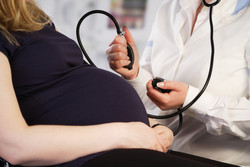Predicting and preventing pre-eclampsia is becoming a reality
The EU-funded project ASPRE(opens in new window) (Combined multi-marker screening and randomised patient treatment with aspirin for evidence-based pre-eclampsia prevention) translates the results of previous research into effective prenatal care. Several biomarkers for early detection of pregnancies with high risk of developing PE have already been identified. In vitro research suggests that aspirin is the most promising agent for preventing PE. Small-size clinical studies indicate that prophylactic use of low-dose aspirin starting before 16 weeks gestation can decrease PE prevalence by 50 %. ASPRE's model of PE prediction estimates individual patient-specific risks of PE requiring preterm delivery. It combines maternal background risk with biophysical and biochemical markers. The project estimates it will screen over 33 600 pregnancies and recruit more than 1 600 women with high risk of PE for the randomised study. It will evaluate aspirin (150 mg) efficacy when taken daily from between 11 and 13 to 36 weeks versus placebo. During the first half of the three-year project, ASPRE developed the risk assessment model that estimates individual patient-specific risks of developing PE. A pilot study examined the prediction model's accuracy and logistics. Several PE prediction kits based on immunodetection with monoclonal antibodies and DNA polymorphism analysis are under development. ASPRE partners expect to successfully transfer scientific and clinical knowledge into clinical practice. Anticipated reduction of PE prevalence will make a major difference by saving women's lives and preventing foetal loss and newborn complications. It is estimated that within 5 years after completion of the project about 2-3 million women will be screened using the ASPRE protocol. Among them, the use of aspirin will allow avoiding at least 11 000 cases of PE, saving many lives. The cost saving is estimated to be at least EUR 803 million for immediate health care expenditures and much higher for long-term treatments.







